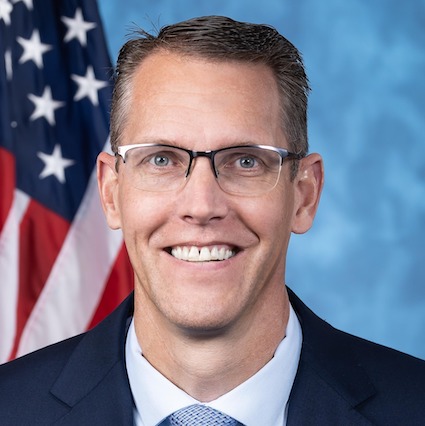With Steve King no longer serving in Congress, I rarely find an Iowan’s name on a short list of U.S. House Republicans doing something outrageous–like the twelve who voted this week against awarding Congressional Gold Medals to the Capitol Police, the D.C. police, and the Smithsonian Institution for their work on January 6.
But Representative Randy Feenstra, who defeated King in last year’s fourth district GOP primary, has quietly signed on to a Republican project that is just as offensive to democracy.
Longtime Congressional reporter Jamie Dupree broke the news in his Substack newsletter, Regular Order, on March 16.
Not only do most Republicans oppose statehood for Washington, D.C., but some GOP lawmakers don’t want D.C. residents voting for President at all. Rep. Dusty Johnson (R-SD) has introduced H.J. Res. 19 to repeal the 23rd Amendment, which allows voters in D.C. to vote for Presidential electors.
Feenstra is among the constitutional amendment’s nine co-sponsors, having signed on in late January.
Dupree commented on Twitter,
This GOP amendment to the Constitution would block over 527,000 registered voters in Washington, D.C. from voting for President.
That’s almost double the number of registered voters in Wyoming.
It’s almost as many registered voters as in the entire state of South Dakota.
The 527,652 registered voters in the nation’s capital also outnumber the 524,171 residents of IA-04 who are registered to vote, according to the latest official figures from the Iowa Secretary of State’s office.
Johnson objected to Dupree’s characterization, calling it “dishonest reporting,” since “The point of my bill is to provide suffrage to residents, not take it away.” As Dupree explained on March 17,
NO STATEHOOD. Johnson’s goal is preventing Washington, D.C. from becoming a state. His plan is the “DC-Maryland Reunion Act,” which would send residential areas of the city back to the State of Maryland. Then he would repeal the Twenty-Third Amendment which allows D.C. voting for President.
RETROCESSION. But the idea of D.C. reverting to control under Maryland – also known as retrocession – has never had strong support in D.C. or Maryland. It has as much chance of becoming law as the idea of merging the Dakotas back together to form one state.
Feenstra’s co-sponsoring the “DC-Maryland Reunion Act” as well. His staff did not respond to Bleeding Heartland’s inquiries about why he is backing this agenda, which has little support among the Americans who would be directly affected. He hasn’t mentioned these bills in any news releases or social media posts.
It’s not enfranchising to take three electoral votes away from DC. Moving the district’s residential neighborhoods to Maryland would add at most one electoral vote to that state’s total, and possibly none.
The obvious goal of Johnson’s legislation is to make it harder for a Democrat to win a presidential election. About 76 percent of Washington’s registered voters are Democrats. That’s almost a mirror image of Feenstra’s home turf of Sioux County, where about 71 percent of those registered are Republicans. Overall, the IA-04 electorate is about 41 percent Republican, 32 percent affiliated with no party, and 25 percent Democratic.
Feenstra’s constituents are also overwhelmingly white. In contrast, about 46 percent of DC residents who would be disenfranchised by repealing the 23rd Amendment are Black or African American, 11 percent are Latino, and 36.6 percent are white and not Latino.
The effort to revoke DC’s participation in presidential elections is so far out there that not even a dozen House Republicans are on board. That Feenstra is one of them doesn’t reflect well on Iowa, one of sixteen states to ratify a constitutional amendment on DC statehood in the 1970s and 1980s.
P.S.- Unlike his predecessor, Feenstra doesn’t grab national headlines with racist comments. But as Andy Kopsa reported for Bleeding Heartland last month, the new representative from IA-04 used his seat on the House Agriculture Committee to push (unsuccessfully) for reducing loan forgiveness to Black farmers.


1 Comment
As some Iowans predicted, and as The Who put it long ago...
…Meet the new boss, same as the old boss.
PrairieFan Sat 20 Mar 6:17 PM